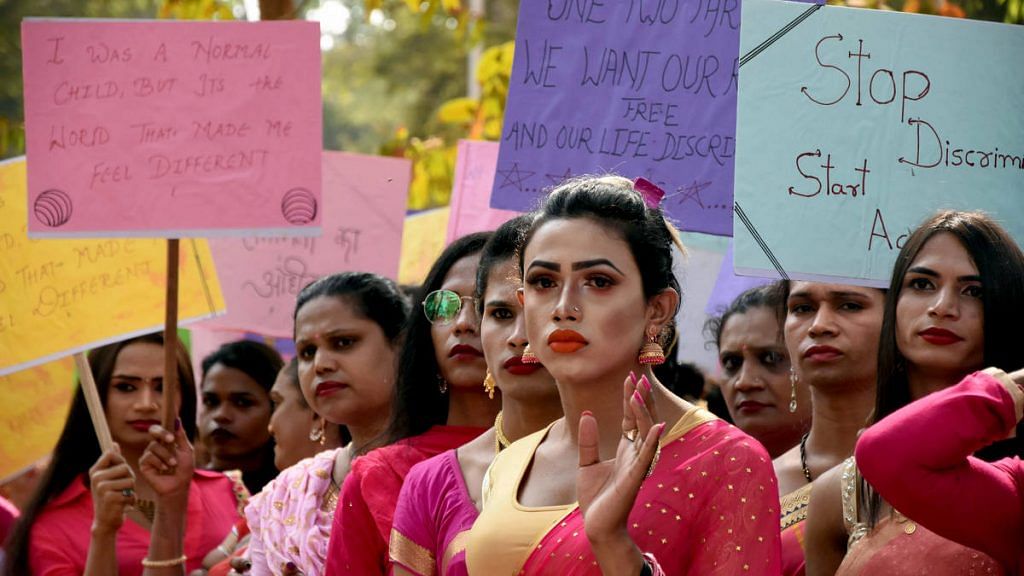New Delhi: Transgender persons, who had to run from pillar to post for genital reconstruction surgeries, will soon be able to get the procedure done for free at state-run hospitals. They will also be provided accommodation and schooling by the government, according to the Transgender Persons (Protection of Rights) Rules, 2020.
The rules, which are expected to be notified soon, would make it mandatory for at least one government hospital in every state to provide gender affirming or sex reassignment surgeries (SRS).
SRS refers to a set of surgical procedures by which a transgender person’s genital organs are altered to give them bodies they feel more comfortable in.
Currently, these surgeries are exorbitantly priced and out of reach for many who want to opt for them. In the absence of legislation, not many government hospitals offered the option.
But now, under the newly drafted rules, the hospital would not only be required to perform the surgery free of cost, but also provide counselling and hormone replacement therapy to members of the transgender community, along with state medical insurance to cover the cost of the procedure, including counselling, in private hospitals.
Beyond the surgery, the rules also look at the other health issues of transgender persons, both at government and private hospitals. Under the legislation, transgender people would be provided accommodation and schooling, while gender non-conforming and intersex children will have the opportunity to join residential government schools and universities.
Also read: Struggling transgenders, HIV patients, sex workers approach govt for shelter & livelihoods
‘Suggestions incorporated’
The social justice ministry had issued a notification on 10 January, notifying the Transgender Persons (Protection of Rights) Act, 2019, that was passed by Parliament on 26 November and received the President’s assent on 5 December 2019.
Following this, on 18 April, the government released the draft rules for the Transgender Persons (Protection of Rights) Act, 2019, asking for suggestions to be sent by the deadline of 18 May.
A group of trans activists wrote to the ministry pointing out that due to the lockdown, they were not able to go out and interact with the community members and needed more time.
However, a senior ministry official said a number of suggestions were received, many of which have been incorporated in the final rules.
One of the major objections that the ministry had received was over the use of the word “enumerate”. “This has been deleted as many people had pointed out that they were concerned over misuse of the term ‘enumerate’, wherein many fear that a listing may be carried out and might become available to those who ask for it, affecting their identity protection,” said a second official.
Also read: Modi govt releasing draft rules on Transgender Persons Act in lockdown a blow to community
Other facilities promised
According to the revised rules, the suggested list of welfare schemes to be considered by the states also include “access to health”. Under this, states have to provide separate wards for transgender persons, medical insurance/Aarogyasri cards, counselling and assistance for other health issues.
Under access to education, scholarships are to be provided for transgender students. They will also be provided protection against ragging in educational institutions, with provisions for grievance redressal and facilitation of accommodation and schooling for transgender, gender nonconforming and intersex children in residential government schools and universities.
Similarly, states have to provide affordable housing, shelters and community centres that provide nutritious food and counselling for at-risk transgender youth.
Transgender persons also have to be given universal access to food security schemes and ration cards. “Pension for aged, disabled or other vulnerable transgender persons, old age and retirement homes for transgender persons facing housing exclusion and public transport to have harassment-free zones for transgender persons” are some of the other things the rules guarantee.
Under economic support, they have to be provided universal coverage of life insurance. “Explicit inclusion of transgender persons in employment guarantee schemes such as MGNREGA and all social security schemes. Formation into self-help groups for livelihood activities. Provisions of zero-interest and other micro-finance schemes” will also be provided.
Also read: For Chennai’s transgenders, buying milk has become a luxury they can’t afford in lockdown
